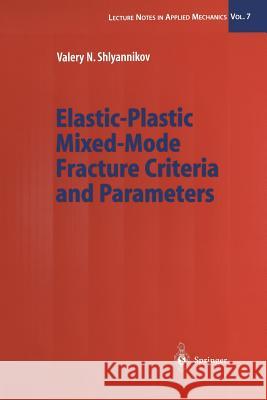Elastic-Plastic Mixed-Mode Fracture Criteria and Parameters » książka
Elastic-Plastic Mixed-Mode Fracture Criteria and Parameters
ISBN-13: 9783642536595 / Angielski / Miękka / 2012 / 246 str.
My wife Tatyana, daughter Mariya, son Alexandr It is well known that the mixed-mode conditions appear when the direction of the applied loading does not coincide with the orthogonal K, -Kn-Km space. In general, in the industrial practice the mixed-mode fracture and the mixed-mode crack growth are more likely to be considered the rule than the exception. Miller et al. considers that cracks can grow due to a mixture of processes (ductile and brittle), mechanisms (static, fatigue, creep) and loading modes (tension, torsion, biax ial/multiaxial). Additionally mixed-mode crack-extension can be affected by many other considerations such as artifact geometry (thin plates, thick shells, and the size, shape and orientation of the defect), environmental effects (temperature, gaseous and liquid surroundings), material state (crystallographic structure, heat treatment and route of manufacture) and stress conditions (out-of-phase and ran dom loading effects). The main feature of the mixed-mode fracture is that the crack growth would no longer take place in a self-similar manner and does not follow a universal trajec tory that is it will grow on a curvilinear path. There are various fracture criteria, which predict the behavior of cracks in brittle and ductile materials loaded in combined modes. Linear elastic fracture mechanics (LEFM) criteria predict basi cally the same direction for crack propagation. Cracks in brittle materials have been shown to propagate normal to the maximum tangential stress. In ductile ma terials yielding occurs at the crack tip and LEFM is no longer applicable."











